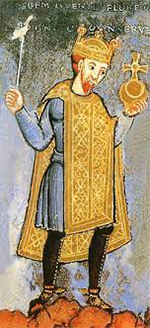Henry III: German King, Holy Roman Emperor
Henry III was Holy Roman Emperor and King of Germany during two turbulent decades in the 11th Century. 
He was born on Oct. 28, 1016. His father was Conrad of Worms, and his mother was Gisela of Swabia. His father was named Holy Roman Emperor Conrad II in 1027 and designated his son his heir apparent in that same year. Conrad also designated Henry, then just shy of his 11th birthday, Duke of Bavaria. A year later, Henry found himself crowned King of Germany. Henry's father spent his years as emperor consolidating his reign, fending off challenges from neighboring lands, including Burgundy and Hungary. He claimed a hard-won victory by absorbing Burgundy in 1034. Henry had a series of tutors, beginning with his mother, who was literate, something of a novelty for many people in those days. Henry later learned from a handful of bishops, studying the ways of the church and of politics. He also, in 1035, gained a wife, in the form of Gunhilde, the daughter of Canute, King of Denmark, England and Norway. Their only child, Beatrice, was born in 1037. Henry and Gunhilde went to Italy in 1038 so that Henry could help his father there. Gunhilde died on the trip home. Conrad died the following year, and Henry took the imperial throne. He embarked on a tour of his domains and found general favor throughout. All was not perfect, however, and he led an army into Bohemia. The forces of Duke Bretislav I dealt Henry a serious defeat at the Battle at BrŮdek. One year later, Henry reversed the result and accepted Bretislav's homage. Henry also pacified Hungary during this time, fixing the border with that entity for nearly a century. Gisela, Henry's mother, died in 1043. Her death so struck her son that he dedicated himself to religious pursuits and became known as Henry the Pious. Also in that same year, he married Agnes of Poitou. An adept politician, Henry alternated between cajoling and convincing, handing out titles and taking duchies by force. He also took personal control of several duchies. By the mid-1040s, he was the one of the most powerful men alive. He proved this by settling a dispute over who would be the next pope by rejecting all three who had made a claim and choosing his own, who became Clement II. He exerted his power again a year later, when that pope died, naming the eventual Leo IX. Henry and Agnes had a son, named Henry, born on Nov. 11, 1050. Wasting little time, Emperor named his son King Henry of Germany in 1053. Two years later, the boy had a wife, Bertha of Turin, herself only 15. In his later years, Henry had to keep fighting to maintain the entirety of his realm. Hungary again proved an enemy, as did Lorraine. One of Henry's last campaigns was to put down a Slav uprising in the north. It was after that effort, in 1056, that he suffered an illness from which he never recovered. Henry III the Pious died on October 5, at the royal hunting lodge of Bodfeld, near Goslar, in Saxony. His son succeeded him as Henry IV. He and Agnes had two other children who lived into adulthood: Adelaide (1045) and Judith (1054).
|
|
Social Studies for Kids
copyright 2002–2026
David White




